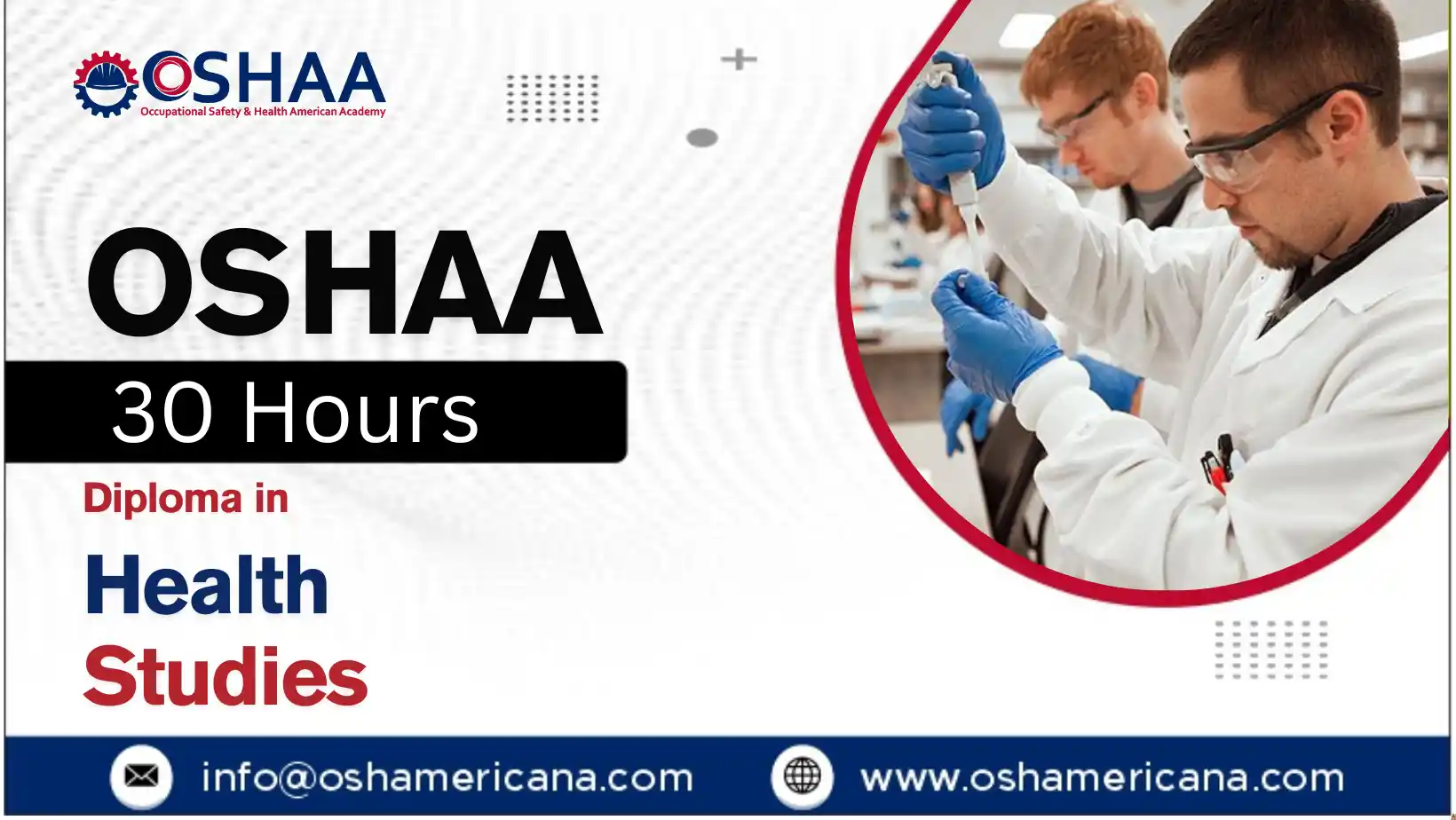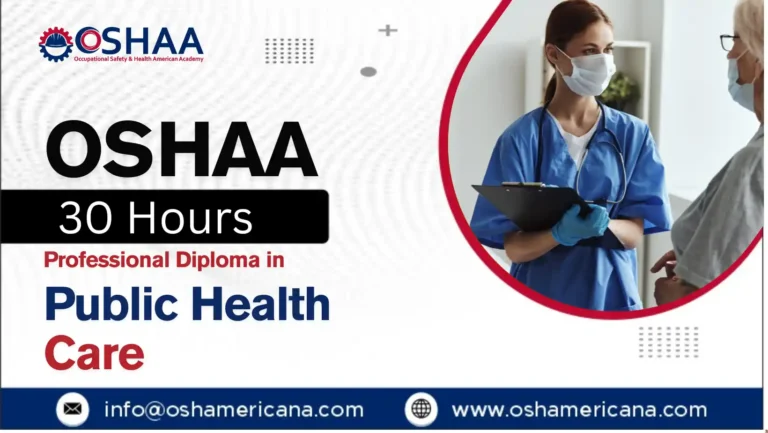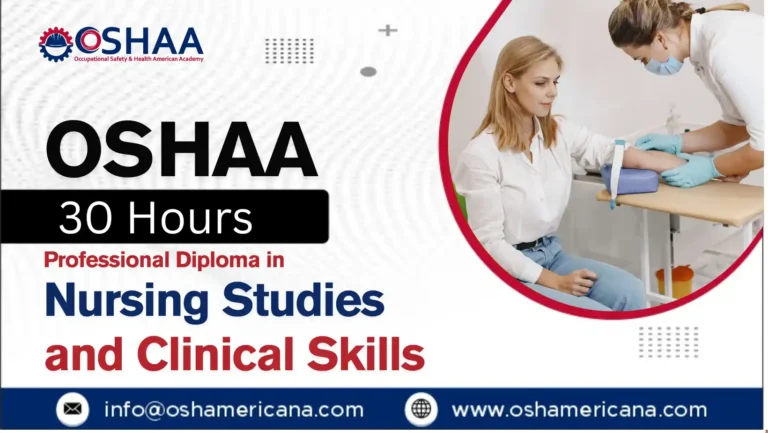Certified Diploma in Health Studies for a Safer, Healthier Workplace
The field of health and safety has never been more vital. With workplace risks evolving and regulatory expectations increasing, professionals across industries are seeking qualifications that not only bolster their understanding but also enhance career prospects. One such valuable qualification is the OSHAA 30-Hours Diploma in Health Studies, designed for individuals committed to mastering occupational health and safety principles.
The OSHAA 30-Hours Diploma in Health Studies is a structured educational program that equips participants with a comprehensive understanding of health and safety protocols, risk management strategies, and regulatory compliance. Though often associated with the Occupational Safety and Health Administration (OSHA) standards, the OSHAA 30-Hour diploma is tailored for international relevance, providing a solid foundation for those working in varied sectors including construction, manufacturing, healthcare, and education.
The OSHAA 30-Hours Diploma in Health Studies stands out as a valuable credential for professionals dedicated to creating safer, healthier workplaces. Whether you’re new to the field or looking to expand your current skill set, this diploma offers practical insights, recognized qualifications, and a meaningful boost to your career trajectory.
Investing in your health and safety education is more than a personal gain—it’s a commitment to protecting others, fostering responsible workplace culture, and promoting long-term wellbeing.
OSHAA 30-Hours Diploma in Health Studies
Study Units
Learning Outcomes
Introduction to Occupational Health and Safety (2 Hours)
- Understand the fundamental principles of occupational health and safety
- Recognise the importance of maintaining a safe and healthy work environment
- Identify the roles and responsibilities of employers and employees in health and safety
- Explain the key elements of an effective health and safety management system
Health and Safety Legislation and Compliance (4 Hours)
- Identify relevant UK and international health and safety legislation
- Understand the legal duties of employers, employees, and other stakeholders
- Explain the consequences of non-compliance with health and safety laws
- Apply legal requirements to real-world workplace scenarios
Hazard Identification and Risk Assessment (4 Hours)
- Define what constitutes a hazard and a risk in the workplace
- Recognise different types of workplace hazards
- Conduct a basic risk assessment using standard methodology
- Evaluate and prioritise risks to implement appropriate control measures
Control Measures and Hierarchy of Controls (5 Hours)
- Understand the principles of the hierarchy of controls
- Select appropriate control measures based on risk assessment findings
- Explain the effectiveness and limitations of different control methods
- Apply control strategies to mitigate workplace hazards
Fire Safety and Emergency Procedures (3 Hours)
- Identify common causes and types of workplace fires
- Understand the components of a fire risk assessment
- Describe fire prevention strategies and emergency evacuation procedures
- Demonstrate knowledge of fire safety equipment and its appropriate use
Manual Handling and Ergonomics (5 Hours)
- Understand the risks associated with poor manual handling techniques
- Apply safe manual handling practices to reduce injury risk
- Identify ergonomic hazards and apply basic ergonomic principles
- Suggest improvements for safer workstation design and layout
Chemical and Biological Hazard Safety (4 Hours)
- Recognise various types of chemical and biological hazards in the workplace
- Interpret hazard symbols and Safety Data Sheets (SDS)
- Understand safe storage, handling, and disposal of hazardous substances
- Apply appropriate control measures to minimise exposure risks
Incident Reporting and Accident Investigation (3 Hours)
- Understand the importance of prompt and accurate incident reporting
- Identify key elements of an accident investigation process
- Explain methods for gathering and documenting incident evidence
- Use investigation findings to implement preventive actions and improve safety performance
- Acquire a robust foundation in occupational health and safety principles, applicable across diverse sectors
- Develop the competence to identify, evaluate, and mitigate workplace hazards through structured methodologies
- Enhance understanding of legal frameworks and ensure alignment with national and international compliance requirements
- Strengthen capabilities in incident reporting, root cause analysis, and the implementation of corrective actions
- Cultivate practical skills to respond effectively to emergencies and promote a proactive safety culture
- Improve professional credibility and support progression into advanced health and safety roles
- Contribute to organisational risk reduction and the promotion of health, wellbeing, and productivity in the workplace
- Establish a solid platform for pursuing further professional qualifications within the field of health and safety
- Demonstrate commitment to best practices in workplace safety, appealing to employers and regulatory bodies
- Engage with applied learning through case studies and real-world scenarios, enhancing decision-making and problem-solving abilities
This course is designed for professionals who hold responsibility for workplace health and safety, or those seeking to build foundational expertise in the field. It is particularly suitable for the following roles:
- Health and Safety Practitioners – Officers, advisors, and coordinators involved in developing and implementing safety policies
- Supervisors and Managers – Individuals overseeing teams or operations with accountability for maintaining safe working environments
- Human Resources Professionals – Personnel involved in employee wellbeing, training, and regulatory compliance
- Compliance and Risk Management Officers – Those responsible for ensuring adherence to legal and organisational safety standards
- Aspiring Health and Safety Professionals – Individuals preparing to enter the field or seeking formal recognition of their knowledge
- Sector-Specific Personnel – Professionals working in construction, manufacturing, healthcare, logistics, education, and office-based settings
No prior qualifications are necessary, making the course accessible to both new entrants and experienced individuals seeking structured professional development.







